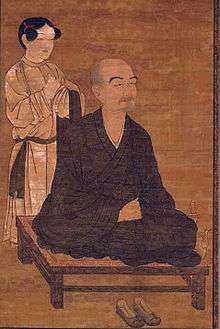Huiguo
Huiguo (Chinese: 惠果; pinyin: Huìguǒ; Wade–Giles: Hui-kuo) (746–805) was a Buddhist monk of Tang China who studied the Vajrayana tradition recently imported from India. Later Huiguo would become the teacher of Kūkai, founder of Shingon Buddhism, a prominent school of Buddhism in Japan.

Biography
Huiguo was one of two Buddhist masters at Xi Ming Temple, the other being the Indian monk Prajñā. Huiguo began his study of Buddhism as a śrāmaṇera at age 9 under a senior disciple of Amoghavajra, an Indo-Sogdian monk of the tantric tradition, eventually becoming a direct disciple. By age 20 in 766 CE, Huiguo was ordained as a monk and extensively studied the Womb Realm and Diamond Realm mandalas before being fully initiated into Vajrayana that same year by Amoghavajra.
Succession
In time, Huiguo's prominence attracted students from Korea, Central Asia and even Java, aside from his Chinese students. By 805, Huiguo was introduced to the Japanese monk Kūkai, who writes of the encounter (emphasis added):
As soon as he saw me, the abbot [Huiguo] smiled, and said with delight, "Since learning of your arrival, I have waited anxiously. How excellent, how excellent that we have met today at last! My life is ending soon, and yet I have no more disciples to whom to transmit the Dharma. Prepare without delay the offerings of incense and flowers for your entry into the abhiseka mandalas [Womb Realm and Diamond Realm].
Huiguo began an intensive training of Kūkai that ended when he died in 805 CE. While the tantric tradition largely died out in China, the lineage survived in Japan as the Shingon school.
References
- Abe, Ryuichi (1999). The Weaving of Mantra: Kukai and the Construction of Esoteric Buddhist Discourse. Columbia University Press. pp. 118–127. ISBN 0-231-11286-6.
- Buswell, Robert E., Lopez, Donald S. Jr. (2014). The Princeton Dictionary of Buddhism, Princeton: Princeton University Press, 364-365